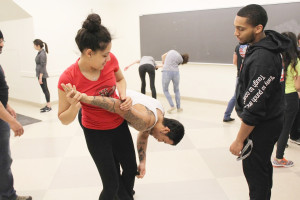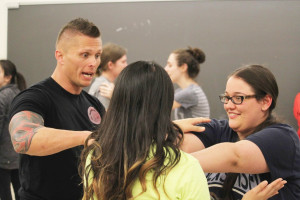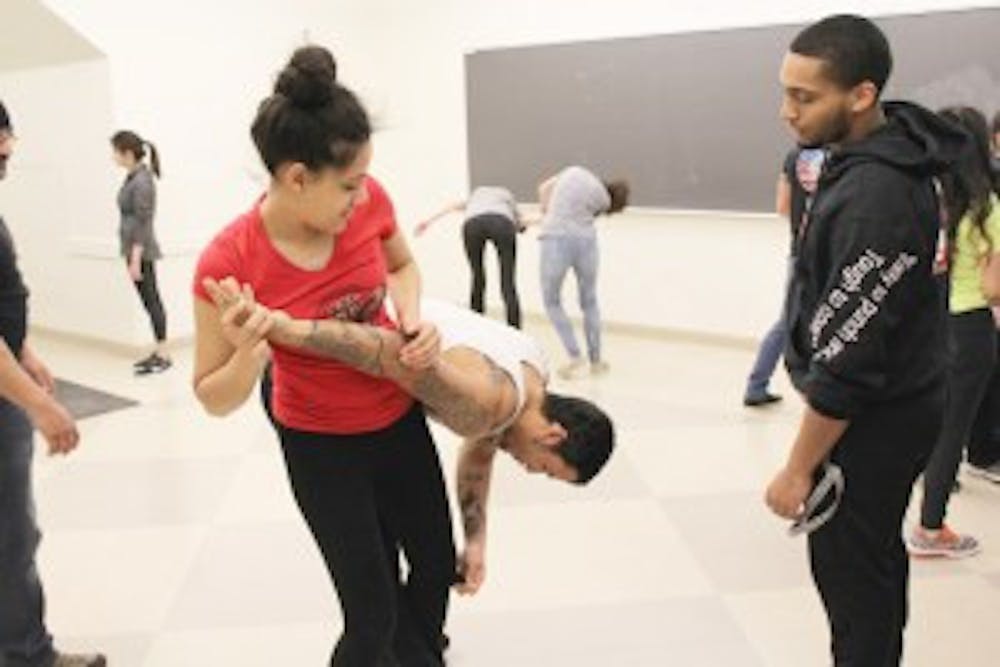By Zack Pastore
Correspondent
The sisters of Chi Upsilon Sigma sorority invited other women on the College’s campus to join them for a martial arts class in the Social Sciences Building on Wednesday, March 30.
“Just in general it’s always a good idea to give girls the option (to defend themselves),” said Genesis Arteta, senior sociology major and president of Chi Upsilon Sigma.
Two instructors from Mercer Bucks Muay Thai, in Levittown, Pa., led the event. Together, they trained the roughly 20 students in multiple self defense moves. The almost exclusively female group of students had never taken a self defense class before, but many said they believed it was important to attend the event.

“(It is important) that women should not surrender to unwanted attention and these skills provide women with some tools on how to escape dangerous situations,” Areta said. “Attacks can happen instantly and hopefully with this seminar we have provided women with different options in defending themselves.”
Some of the moves that were taught were a “bear hug escape,” a move where a person would break the grip, drop their weight and push back on an attacker. Another move that was discussed was the “stand up escape,” in which a person stands up and escapes from being tackled.
Roger Doobraj, one of the instructors at the event who has 18 years of experience training Muay Thai, also talked about where on the body to strike when defending yourself. The fourth and final skill of the night was “verbal cues,” which can be used to let a possible attacker know that a person sees them as a threat.
Another factor taught in the seminar was situational awareness, which is being aware of the situation you are in, as well as having an awareness for what is going on in it. One factor for situational awareness is pre-incident indicators, such as charm, type casting, loan sharking, unsolicited promise and discounting the word no. Doobraj also discussed intention assessment, which is figuring out what the other person’s intention is. This is an important skill that helps you determine potential attackers.
“Over 70 percent of the victims know the attacker,” Doobraj said. He went on to say that it is important for college students to learn martial arts so that they can access their “inner voice,” which can help prevent them from ending up in any uncomfortable, and more importantly, unsafe, situations.
Following each demonstration, students then broke themselves up into groups and practiced the moves they had just learned for themselves.
“It was easy to see (that they learned something)... maybe they did not do (it) perfect, but they escaped, they survived… they learned,” said Damien Chojnowski, one of the instructors with 17 years experience in Muay Thai.
Participants also learned to not be intimidated by their opponents — regardless of their size.
“It’s not just about the size of your opponent when in danger, but the tricks you can use that may just save your life,” Areta said. “Women need to understand that they are powerful beings and this seminar was to do just that, empower them.”

The elements of the Muay Thai style of fighting include tactics from Jiu-Jitsu, Filipino Arts, Indonesian arts and street fighting applications. Some of these elements are feints and counter attacks. Misleading your opponent is also a beneficial thing to do, which is where you lead them into thinking you are doing one thing and then you go on to do something else in a surprise attack.
Chojnowski said that cell phones create the biggest distraction, giving attackers the opportunity to strike.
“Avoid the situation… the cell phone is the biggest enemy,” Chojnowski said. “If I’m walking down the street and I see someone coming and I don’t like what they’re doing, I’m going to (cross) the street… treat everyone as a threat.”
— Tom Ballard, Opinions Editor, contributed to this report.







